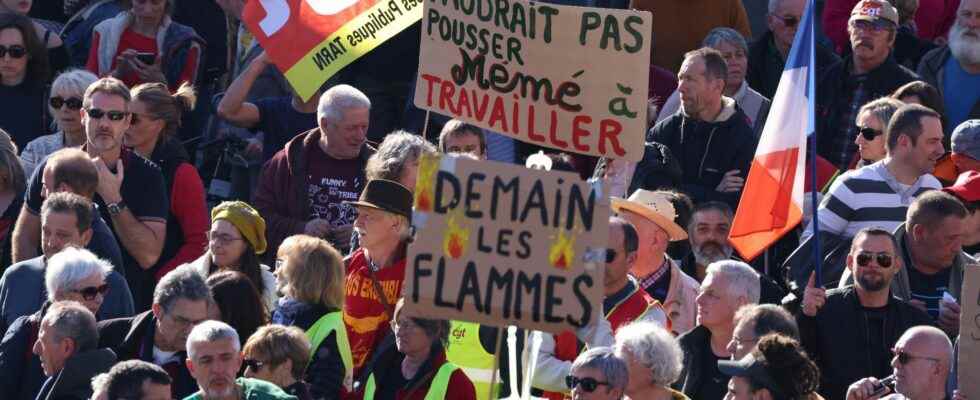Each pension reform has led to its share of protests. If most succeed – with the exception of that brought by Alain Juppé in 1995 – they raise the question of the place of the street and of social protest in the political debate. Since the first day of the demonstration on January 19, the movement has enjoyed broad public support. Historian Danielle Tartakowsky analyzes the mechanics of this mobilization.
L’Express: The fifth day of demonstration against the pension reform was marked by a decline in mobilization. Should this be seen as a sign of discouragement?
Danielle Tartakowski: Everyone knew that this day would be less important. First because there are holidays, then because we talk a lot about the day of March 7, and therefore everyone is waiting for this date. When you’ve been fighting for years and you’re not heard, it can give rise to anger. It gives yellow vests, it gives this mobilization in medium-sized cities where we observe a social anchoring beyond the usual militant framework. The idea of having demonstrated in Albi to signify the place of these medium-sized towns in the movement was an excellent idea. Not just media. It also creates the image of a movement.
On March 7, the unions called for the “total blockage” of the country, is this a sign of a hardening of the movement?
Switching to renewable strikes is a way of going a step further. In our history, the great social movements which produced changes on the spot were strikes accompanied by demonstrations. When there is no strike, it is not the same thing. The strike has economic effects. The protest has none. In the situation in which we find ourselves, this dimension is crucial.
Whatever the strength of a demonstration, if it is not accompanied at a given moment by attacks on production, immobilizing the economic sphere, it has limited effects. If the deafness – or what is felt as such – remains as it is, I fear that there are forms of violence that develop. By dint of being disappointed, one can be very angry. But violence is not a factor of victory. The only violence that has led to decisions being made is unexpected violence, by an unexpected type of actor.
You mention a “deafness”, does the street still have a role to play in the political debate? Can she still bend a government?
It’s never that simple. We can clearly see that today the government has reached a political impasse. The mobilization is extremely strong, but there are always demonstrations which prevail immediately, and then there are demonstrations which produce delayed effects. They act in one way or another on the balance of power.
If you think about it, the first mobilizations against pensions were in 1995. It’s been 30 years and in total, there is still a generation that has retained its achievements. The notion of success is not always immediate. As far as the unions are concerned, they remain by far the main organizers of these demonstrations. They have a real negotiating role. On condition only that there are negotiating partners opposite. Which hasn’t been the case for years.
Have you identified elements that may have led a mobilization to gain the upper hand and prevail over a bill?
There is no recipe. We note nevertheless that the demonstrations which prevailed corresponded either to periods of cohabitation, or to periods of strong contradictions within the government. In a way, we are in a sequence where there are strong contradictions within what is no longer even a majority. This is an element to take into account.
What is certain is that with the yellow vests, but also with the student barricades of 68, there was the irruption of new actors, who are fighting in new forms. Nobody expected it. Neither the police nor the executive. And so there are not necessarily ad hoc devices. In both cases, it took the governments a fortnight to build their strategy. And it is undoubtedly an element which has contributed, in very different forms, to scoring points. There, we are in a classic force of action.
Can we see a close link between the street, social mobilizations and the French?
The street has played a central role in the history of this country. It has helped make and break regimes for more than a century. This sequence was interrupted in the 1880s. This does not exclude that it played a much more central role in our country than in neighboring countries. There is also an imaginary of the street to take into account. It is obviously linked to the story, but it has been aestheticized. Whether it’s Victor Hugo or Delacroix, it could produce strong fantasies.
